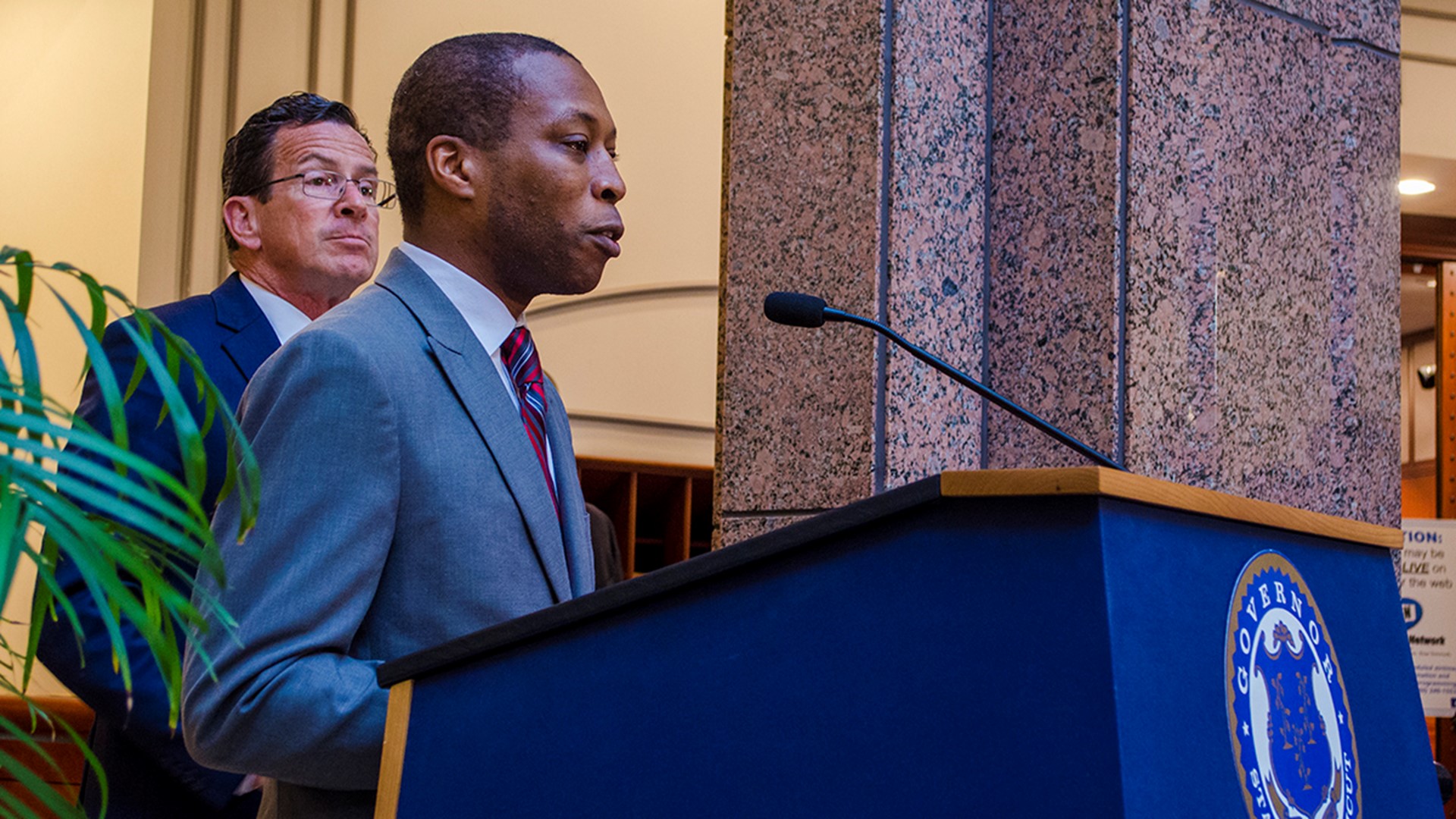Marcus Harun investigates one teacher’s challenges in attempting to stay and teach in the United States
HAMDEN, CT—Five months into her American teaching career, Haiyan Bai had a very difficult time explaining to her students that she would no longer be their teacher, but she had been facing greater challenges ever since her first week.
“I didn’t know how to explain it to my students—I had no idea,” Bai said. “That’s why I couldn’t help myself crying there. This news came to my students totally all of a sudden.”
Bai is a Chinese national who began teaching Mandarin Chinese at Hamden High School in the fall of 2009 through College Board’s Guest Teacher Program. Her employment was terminated in December, which also terminated her J-1 visa which meant she could face deportation if she did not return to China within 30 days.
She hadn’t been paid according to her contract ever since she was hired, and she sought the help of legal counsel to help settle the dispute, she said. She was also allegedly involved in a physical altercation with her roommate, another Hamden teacher, and taken into police custody on Dec. 20. It is unclear whether the pay dispute or the altercation led to her firing on Dec. 23.
While she was back teaching her classes the day after her arraignment, she was told that it was her last day teaching at Hamden High School. Bai was left with the very hard task of breaking the news to her students.
“I have never talked about this kind of thing with my students,” Bai said. “They think I’m a very happy teacher and all of a sudden I have to leave all of a sudden without proper reason.”
Many of her students couldn’t believe the news.
“I never even saw her angry at all,” said Jenna McPhail, Hamden High School senior and Bai’s former student. “I immediately didn’t believe it—it was very, very, very out of character for her.”
It became clear in the following weeks just how fond students were of Bai when they stood up for her, protesting her dismissal and calling for the school board to reinstate her. Bai was cleared of all criminal charges and she said that she feels she was wrongfully fired. She is now suing Hamden Public Schools (HPS) and College Board claiming they violated her due process rights and her civil rights.
THE BEGINNING
In Feb. 2009 Bai was teaching English at Shanxi Normal University, seven hours south of Beijing.
She applied for the guest teacher program when she found a notice in her office saying that Hanban, a Chinese teaching agency, was recruiting some teachers to travel to the U.S. to teach Chinese.
“To be in the program definitely would be helpful to a teacher who teaches English like me to learn as much as possible about different countries,” Bai said “It’s a great opportunity to learn about the cultures and the country.”
She was accepted to the program and was granted a J-1 Visa, a non-immigrant visa issued by the United States to “provide an extremely valuable opportunity to experience the U.S. and our way of life, thereby developing lasting and meaningful relationships,” according to the State Department website.Bai decided to do just that.
“In China a lot of information about America is available, but the thing is, it probably is far away from the average American’s daily life,” she said. “I don’t think it was 100% accurate, it would be one perspective to live there and experience it.”
After training in Beijing and at Stanford University, she began teaching on Aug. 30. Hamden Public Schools arranged for Bai to share an apartment with Li Li, a Chinese teacher at Hamden Middle School, who was participating in the same program. According to their “Letter of Appointment,” she and her roommate were supposed to get a salary of $26,967 and $8,500 benefits.
“Since it’s a salary I was thinking that I would be paid just like any other teacher,” Bai said. “I thought we’d be paid in the same fashion. On the very first Friday, all the other teachers were paid, but there was no payment for Li Li and I. We thought next time probably we’d get paid.”
Two weeks later, when Hamden teachers received their next pay check, Bai and Li Li still were not paid.
“Then I thought maybe we’d be paid by months—and still there was no money,” Bai said. “Both of us were running out of money. So in the middle of September we started to go to different people. I was asking the assistant principal, when I should go talk to Principal Highsmith about my salary. I told him I hadn’t been paid and I wanted to know why.”
Soon after, Hamlet Hernandez, assistant superintendent in charge of personnel, called Bai to discuss her salary. He asked Bai if she had brought all the money she was paid by Hanban with her to the United States.
“When I said no, I didn’t bring all the money to the USA, he sounded pretty surprised,” Bai said. “He said the money Hanban gave me was supposed to be brought to the USA all together. He was not talking about the salary we were concerned about—the one promised by HPS. I was confused by his answers.”
After another conversation with the principal, she was told that she would be paid on the next payday. On Sep. 17 she received a paycheck for $725, which amounted to $100 per week, Bai said.
“This is very different from what we had been promised,” Bai said. “I didn’t know what to do. I was trying to figure out the difference between benefits and salary. I went to some of my friends and finally I went to a local lawyer’s office and I confirmed that the benefits are something you get besides your salary.”
Bai was having trouble living on that salary so she complained to Superintendent of Schools Frances Rabinowitz.
“I wanted to travel to many places but we couldn’t—the money wasn’t available,” Bai said. “The food was very expensive so we had to cook by ourselves.”
During her next meeting with the school’s financial director, she was told all her benefits would be deducted from her salary, Bai said.
She felt that there was no point in talking to anyone from the school district about her salary, because they had already made their decision, she said. So on Oct. 22 attorney Peter E. Ricciardi sent a letter to HPS on Bai’s behalf asking them to pay her according to the contract.
After HPS did not respond, Ricciardi sent another letter to the school district on Dec. 11, saying that if they did not pay Bai as they promised, he would take legal action. There was still no reply.
THE INCIDENT
Bai had difficulty living with her roommate—they had very different personalities, she said.
“I thought we should take care of each other—we come from the same place,” Bai said. “But according my observations Li Li is very special person. The whole relationship got from bad to worse.”
Bai said she always kept her things tidy and clean while Li Li did not. Her neighbors complained to Bai that Li Li was leaving her smelly trash in the walkway.
“It brought humiliation and shame to me because I was sharing the same apartment with her,” Bai said.
The two teachers didn’t get along well, but they lived civilly, until the “incident” on Dec. 20 that changed Bai’s life forever.
“She came up to me from her computer desk,” Bai said. “She was waving her hands, I thought she was starting a fight. I raised up my hands to protect my face. Then very bad things happened.”
After a physical altercation, Li Li called the police and Bai was taken into custody and charged with assault in the third-degree and disorderly conduct.
Bai said what Li Li told police was not true.
“It was nothing like what she told the police department,” Bai said. “Nothing she said was totally true. It was very ridiculous. Nobody ever noticed the differences between the two statements.”
TERMINATION
“On the night of Dec. 21, I received a first email from Hanban saying they learned that I have violated the regulations seriously from a party in the U.S., so I had to return to China as soon as possible,” Bai said.
The morning after Bai was taken into police custody, HPS found someone to replace Bai, and arranged for an interview the next day. On Dec. 22 at 9 a.m. they met the replacement teacher and signed a 45-day contract, Bai said. Later that afternoon a personnel official told Bai they had “no idea” about a replacement for her.
On that day, she cried as she was forced to tell each of her classes that this would be her last day teaching them, but did not give much of an explanation why. She never spoke about her personal or economic problems in the classroom.
During the meeting with school officials, they questioned her about “the incident” and told her she did not need to come back and teach before winter recess. Bai had planned a vacation to Iowa to visit a former teacher, and Karolyn Rodriguez, director of world languages, would find Bai a new place to move into after she returned, Bai said.
The officials asked her if she had spoken with College Board recently. Once Bai told them College Board requested her to return to China, HPS changed their mind, Bai said.
“Mr. Hernandez said ‘if you’re not going to teach here then we’re not going to get you a new house—it’s very expensive,’” Bai said. “At the end of our meeting Hamlet stood up and shook my hand and he was saying thanks very much for my professionalism, courtesy and all I’ve done for our students.”
She received another message from Hanban ordering her to return to China by Dec. 25. If she did not return immediately, she would “shoulder the economic losses,” the email said.
THE AFTERMATH
A group of students kept in touch with Bai via email and found out all the details of her ordeal. Bai was well-liked in the school community, so many students and parents were outraged at Bai’s termination.
“The few times that I would spend additional time with her learning outside of class she was just the most absolutely caring individual that I had encountered that entire year,” Bai’s student Jenna McPhail said. “She was very genuine and very patient and kind to her students. She worked hard and you could tell that she always cared about the material that she was teaching and made an effort to tie it back into Chinese culture.”
The students were determined to stand up for their teacher and get her reinstated.
“The class kind of came together to go to the board of education meeting in Hamden and we stood up and spoke in Ms. Bai’s defense,” McPhail said. “Students that had her and other students that wanted to be involved. Some of us wrote letters and emails pleading for her return. But unfortunately they were ignored or just not considered in general.”
About a dozen students stood in front of the Board of Education building prior to their January meeting and protested with signs written in English and Chinese that said “Justice” and “Fulfill the Promise.” Then students and parents gave speeches at the school board meeting pleading for Bai’s case.
“It was wrong for them to deny her the right to work as a teacher in the school because the criminal charges were dropped—there really was no reason for her to be out of work,” McPhail said. “By showing how good of a teacher she is and standing up for her we thought they would give her her job back eventually.”
The school did not respond to Bai or the students, so they sought help from their elected representatives. As Bai’s Jan. 23rd deadline to return to China approached, a group of five students went to the New Haven office of U.S. Rep. Rosa DeLauro, D-3. They asked DeLauro’s aides for her to help extend Bai’s visa.
“Congresswoman DeLauro worked with both the State Department and the Institute of International Education on Ms. Bai’s behalf,” Kaelan Richards, press secretary for the Office of Rep. DeLauro, said. “She also met with local students who were interested in the case.”
Bai’s deadline was getting closer and she was left to reflect on her case.
“To me getting fired was very, very heavy blow,” Bai said. “When the incident happened with Li Li and me I thought my employer should have the decency to wait for the outcome of my legal case. A responsible employer would have done that.”
When her case was tried in Meriden Superior Court it was dismissed within a few minutes.
“They couldn’t wait one day or two days to see the truth,” Bai said. “They want to throw me out of the school—out of the country to go back to China and do whatever I want there. So the salary problem would be done.”
During January, Bai reached out to many immigration lawyers to get advice on her case.
“She was here on a J-1 visa—if the school terminates her status, and the visa was premised on her working for the school, that terminated her lawful presence in the United States,” Daniel Marcus, an attorney at Globman& Marcus, P.C., a Hartford, Conn. firm working exclusively in the field of immigration law since 1946. “The visa status is tied to the school—so if the school wants to let her go, then immigration has no choice than to say ‘she’s no longer here lawfully.’”
She asked Marcus about her options once the deadline had arrived.
“Once she had stayed past that 30 day grace period, she would then be here illegally,” Marcus said. “Then if the immigration service did pick her up, she would go before an immigration judge to determine if she’s here lawful.”
Bai decided to face the consequences and despite her lawful presence in the U.S. being terminated and fight a legal battle against the school.
“These people bullied me with their power about the salary and making go by their rules,” Bai said. “They were pushing my limits all the time. I’m just going to stay and fight, no matter what happens. What could be worse? I already had the worst, I had believed. That’s why I decided to stay past the deadline.”
Bai said someone called and informed her parents that she had been arrested in the United States as a way to shame her and get her to return back to China. Her mother was very frightened at the news and threw the phone, Bai said.
“I could endure all these things. I don’t mind myself going through all the terror and hardships, but I would never want my family to be scared,” Bai said. “I’m so, so far away from home alone, with no friends in the USA, I was in such a unique situation. I don’t want my family to be so, so worried about me.”
Bai’s family was outraged when they heard what happened to her. They agreed that returning to China would not solve the problem, she should sue the school system.
“When Hanban called my parents, I felt so helpless,” Bai said. “I really cried, I cried. That was really cruel. Why should my family go through all of this with me? I asked my sister to keep it a secret—I don’t want my parents to know about it. That’s really bad.”
THE FIGHT
“If I just cowardly returned to china, I would have definitely regretted my decision,” Bai said. “I’m not a coward. I had to do what I can. If I was sent to the immigration bureau I would not complain—I believed it was the right decision to stay.”
She filed a civil lawsuit against Hamden Public Schools and the College Board in U.S. District Court.She is seeking compensatory damages in excess of $75,000, punitive damages and attorneys fees and costs.
“There are several claims in the complaint,” said Bai’s attorney, Albert Oneto IV, from the Law Offices of Peter E Ricciardi. “The first is for a violation in her due process rights. The claim is that the school without notice or without an opportunity to be heard made certain findings about her as a result of an incident at her apartment—that she attacked another teacher and was unfit to teach. They didn’t give her a chance to present her side of the story and they used the findings for the basis of terminating her.”
The School’s attorney believes this case will be dismissed.
“We think that the board will be exonerated—there’s no merit to her case,” said HPS attorney Michael Rose, of Rose Kallor, LLP.
There is also a claim for a violation of equal protections under the law and a claim of a violation to a statue where congress prohibits treating resident aliens different from citizens.
“There is a claim of the violation of Title Seven, discrimination of national origin,” Oneto said. “Which basically claims that the school had a policy of treating resident alien teachers differently from U.S. citizens who were teachers and they deliberately discriminated against her in the way they paid her because she was a resident alien.”
There are claims for breach of contract under state law—regarding the salary dispute.
“She was paid to everything she’s entitled to in that contract,” Rose said. “As far as the money, at the beginning there was some misunderstanding of what she would get paid. But once she got on track, she should have been receiving everything she was entitled to.”
The case is at a motion to dismiss stage, Rose said.
“She’s trying to get lots of tax payer money,” Rose said. “She’s trying to claim that because we fired her she could no longer work in the United Stated, even though she is not from the United States. So she is looking for money.”
She also submitted a complaint to the State of Connecticut Commission on Human Rights and Opportunities. It was dismissed, but it did not affect her right to bring her action in court, her attorney said.
“It was only discouraging the sense that the state of Connecticut and the U.S. government was not going to investigate what the Hamden Public Schools was doing with the College Board in terms of how it was treating Chinese guest teachers, but it did not affect her right to bring her action in court.”
U.S. human rights laws don’t only protect Americans, Oneto said.
“The civil rights statutes don’t just apply to citizens—it applies to all persons,” Oneto said. “The statutes protect persons who are injured by the government when the government violates its limitations of its powers. Resident aliens who are here on a valid visa certainly have rights. Even illegal aliens have been found to have rights under our laws.”
Bai went through all the legal procedures during the spring of 2010. She was deposed by both the prosecuting and defending lawyers by video tape twice and she has submitted her journal as evidence.
As she worked on her legal case, another immigration milestone approached.
“If you remain in the United States past six months after your visa status is up, you incur a three year bar before you can come back,” Daniel Marcus, immigration attorney, said. “If you stay past one year then you incur a 10 year bar before you can come back.”
In August, Bai believed she had done everything she could about her case and flew back to China on Aug. 25, while her attorneys continued to pursue her case. The case has yet to make it to trial.
She was worried when she returned home that she would be disgraced and not allowed to return to her pervious teaching job.
“My University job is still here for me, but I think they heard my experience in the USA was not pleasant,” Bai said. “I think they blame me for my personality.”
She is doing fine now and is glad to be back home safe with her family.
“I am trying to bring my life back on track, and make a living like everyone else,” Bai said.
Her students still keep in touch with her, and it is clear some cared about her a lot.
“We had a teacher who actually knew what she was doing, which was fantastic and quite unique,”McPhail said. “She was very supportive of us trying to pronounce words and try to scribble out characters. She truly cared about what we were doing and I’m really thankful that I took the class because of that.”
Bai is very appreciative of all her students for all their help and support. She never asked them to stand up for her, but they all came together and asked her how they could help.
“They are not like regular students, because a lot of students will just worry about their studies and their own personal lives,” Bai said. “But my students are very caring—they have really deep concern for a person very far away from their own motherland. They have never hesitated to offer help, whatever they could do. These people, these students are like the world citizens, they are international.”





